The ability to check PDF dimensions has become crucial for professionals and individuals alike, ensuring that documents meet specific criteria for various purposes. This guide delves into the methods and tools available for accurately determining both the physical and design dimensions of PDF files. We spotlight UPDF, a versatile PDF editor that not only simplifies this process but also offers a comprehensive suite of measuring features. Discover the ease of managing PDF dimensions and unlock the full potential of your documents with UPDF. Continue reading to explore practical tips and enhance your PDF management skills.
Windows • macOS • iOS • Android 100% secure
Part 1. Exploring PDF Page Dimensions: A Guide to Various Methods
Diving into the specifics of managing PDF files, a common challenge many of us encounter is determining the actual dimensions of the pages within. Whether you're preparing a document for printing, ensuring it fits a particular format, or simply looking to understand its layout better, knowing the page dimensions is crucial. This task, however, might seem daunting given the myriad of file types and software options available today. Fear not, as we're about to embark on a comprehensive guide that explains the various methods to accurately check the dimensions of a PDF. From simple, everyday tools to more advanced software solutions, we'll cover all the bases to ensure you can easily find this essential information regardless of your technical prowess or the tools at your disposal.
1. Using UPDF
UPDF is an all-in-one PDF solution designed to help users easily view, edit, annotate, convert, and manage PDF files across Windows, macOS, iOS, Android, and even with AI assistant. You can click the button below for free download. To determine the size specifications of a PDF document using UPDF's professional interface, follow this guide below:
Windows • macOS • iOS • Android 100% secure
- After you open your PDF on UPDF, click on the "Document Properties" icon at the bottom of the screen to open the properties panel.
- In the properties panel, click on the "Info" tab to view the document information.
- Locate the "Page Size" section in the "Info" tab to see the current page size details.
- If needed, you can change the unit of measurement for the page size from the dropdown menu, which includes options like Point (pt), Inches (in), Millimeters (mm), Centimeters (cm), and Picas (p).
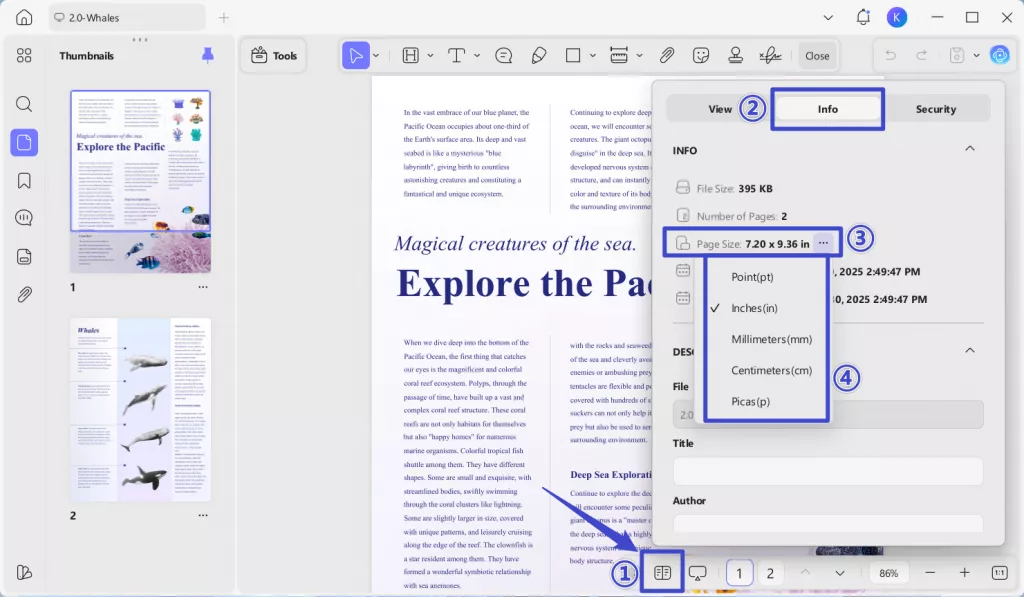
2. Using Adobe Acrobat Pro
One of the most straightforward methods to check the dimensions of a PDF page is through Adobe Acrobat Pro, a widely used tool that offers features for managing and editing PDF files. To view the dimensions in Adobe Acrobat Pro, simply follow these steps:
- Open your PDF file with Adobe Acrobat Pro.
- Navigate to the 'File' menu, then select 'Properties'.
- Click on the 'Description' tab within the 'Document Properties' window.
- Here, you'll find the 'Page Size', which displays the dimensions of the current page in inches or millimeters.
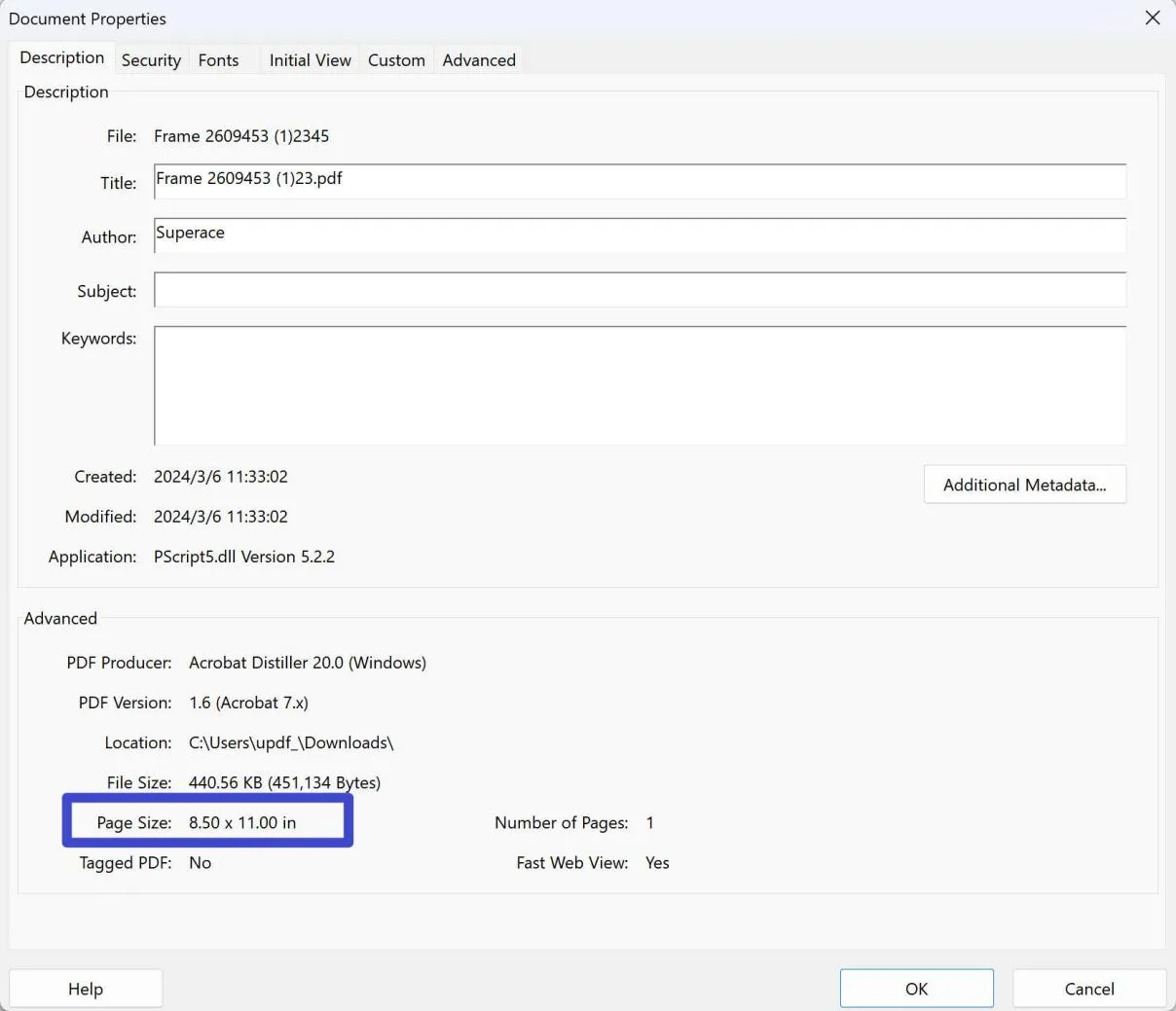
This method is particularly useful for those who already use Adobe Acrobat Pro for their PDF management needs, providing a quick and easy way to access page dimensions without the need for additional software or tools.
3. Using Adobe Reader
For those who do not have access to Adobe Acrobat Pro, Adobe Reader offers a simpler, albeit less direct, method to view PDF dimensions. Adobe Reader, a free version of Adobe's PDF software, allows users to view and print PDF files but with limited editing features. To check the dimensions of a PDF page in Adobe Reader, follow these steps:
- Open the PDF file in Adobe Reader.
- Right-click on the document and click 'Document Properties'.
- Click on the 'Description' tab in the 'Document Properties' dialog box.
- The 'Page Size' field will show the dimensions of the current page.
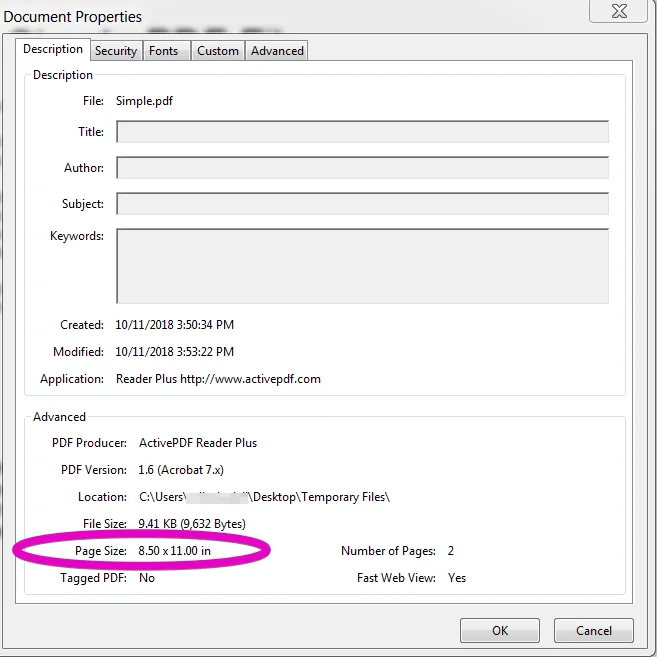
Although Adobe Reader does not offer as many features as Acrobat Pro, it still provides a valuable tool for users needing to access basic information about their PDFs, including page dimensions.
4. Using Foxit PhantomPDF
Foxit PhantomPDF is another excellent alternative for users seeking to check the dimensions of their PDF pages. This software is renowned for its robust set of features tailored for creating, editing, and managing PDFs. To find out the dimensions of a PDF page using Foxit PhantomPDF, follow these straightforward steps:
- Open your document in Foxit PhantomPDF.
- Find the 'File' menu and select 'Properties'.
- In the 'Document Properties' window, switch to the 'Description' tab.
- Look for the 'Page Size' field, which lists the dimensions of the current page in the PDF.
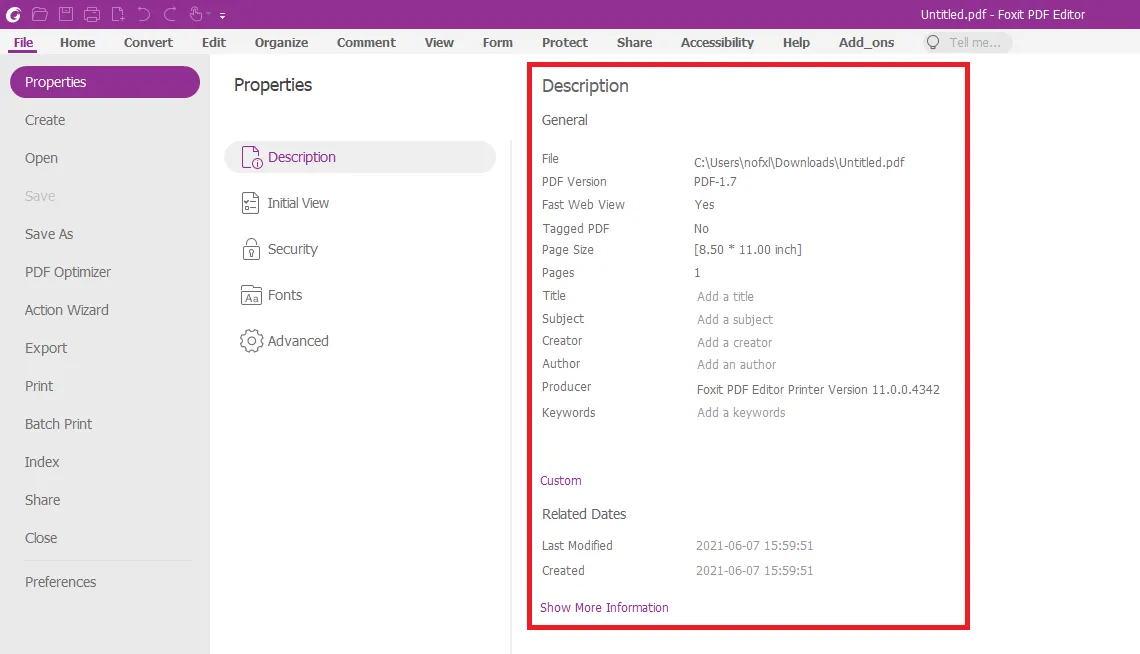
This process in Foxit PhantomPDF not only is intuitive but also provides users with a comprehensive overview of their document's properties, including detailed page dimensions. It's an ideal solution for those who prefer an alternative to Adobe's offerings.
5. Using Mac Viewer
For Mac users, the built-in Preview app offers a convenient and straightforward way to view PDF dimensions without the need for additional software. Preview, which comes pre-installed on all Macs, is not just a PDF viewer but also allows users to perform a range of actions on PDFs and images. To check the dimensions of a PDF page using Preview, follow these simple steps:
- Right-click on the PDF file and go to 'Open with' then 'Preview'.
- Once the PDF is open in Preview, click on 'Tools' in the menu bar.
- Select 'Show Inspector' from the dropdown menu.
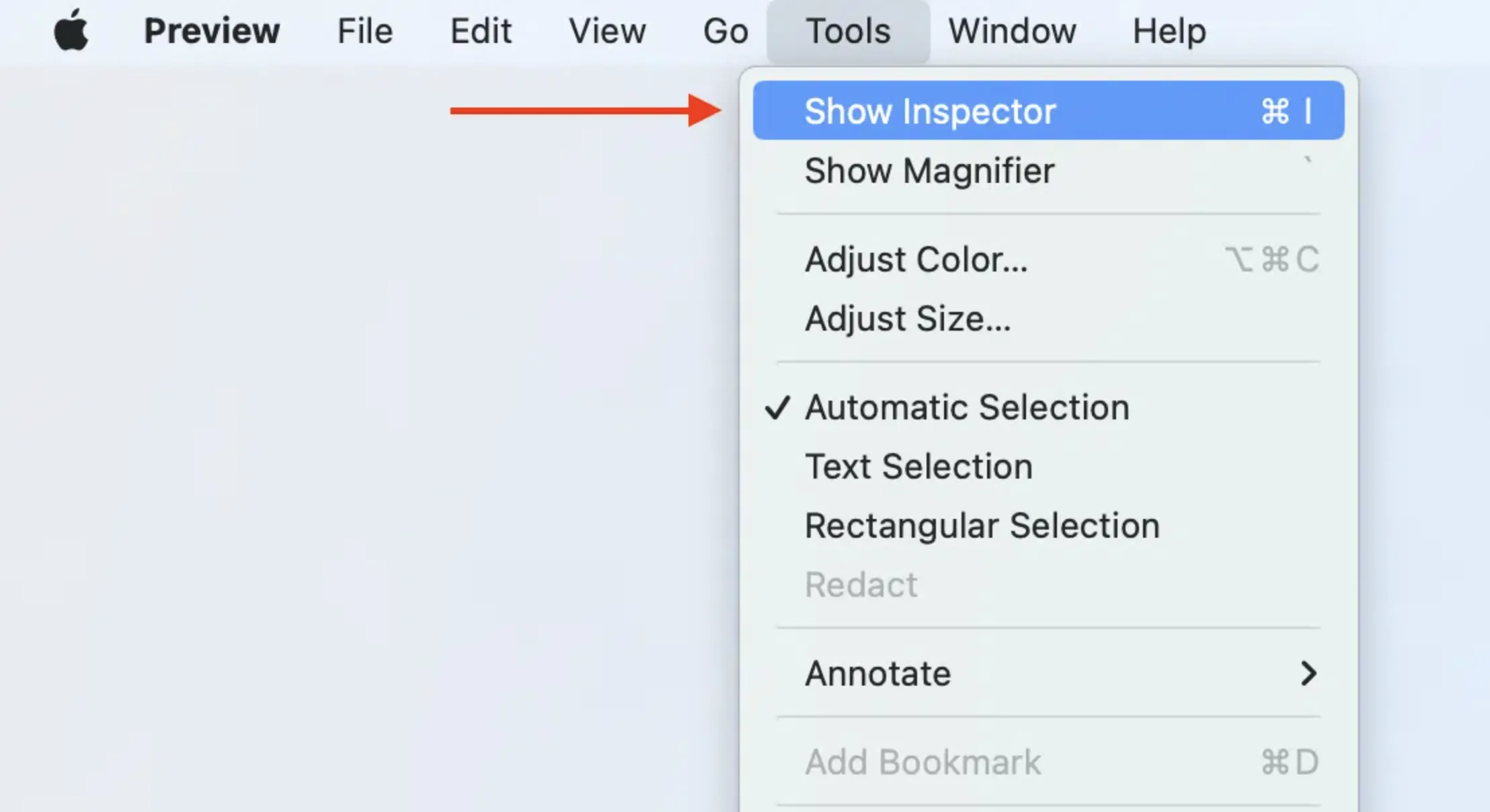
- Click on the 'Details' tab (icon looks like a letter 'i' in a circle) within the Inspector window.
Here, you'll see the dimensions of the currently selected page listed under 'PDF Document'.
This method is highly accessible for Mac users, requiring no additional downloads or purchases, and it efficiently provides the necessary information regarding PDF page dimensions.
Part 2. How Do I Check the Design Dimension in a PDF?
Having explored the various methods to ascertain the physical dimensions of a PDF page across different platforms and software, we now turn our attention to a slightly different, yet equally important aspect: understanding the design dimensions within a PDF. This involves delving into the specifics of elements like images, text boxes, and other content to ensure they meet certain criteria for printing or digital display. The process may seem complex, but with the right tools and approaches, anyone can accurately gauge the dimensions of design components within a PDF file. Let's embark on this journey to demystify the process and provide you with the knowledge needed to navigate the intricacies of PDF design dimensions.
In the realm of PDF management, UPDF emerges as a versatile and user-friendly application, ideal for those seeking to delve deeper into the design dimensions within their PDF files. Unlike traditional PDF viewers, UPDF provides an intuitive interface coupled with a suite of editing tools, making it an excellent choice for professionals and casual users alike. One of its standout features is the ability to measure PDF (including the distance between elements in a PDF), a critical function for checking design dimensions accurately. To utilize this feature in UPDF, follow these steps:
- Download UPDF on your computer.
Windows • macOS • iOS • Android 100% secure
- Open your PDF document with UPDF.
- Navigate to the "Comment" tab in "Tools" on the upper toolbar.
- Select the "Distance Tool" from the options available.
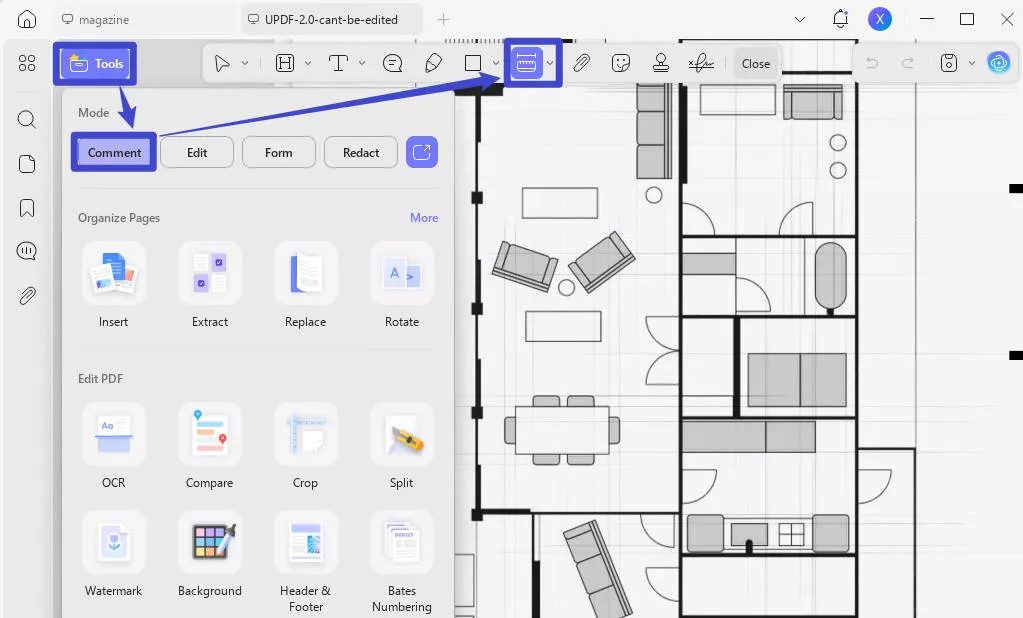
- Click and drag the cursor between two points within your document. UPDF will display the distance measurement, offering insights into the design dimensions.
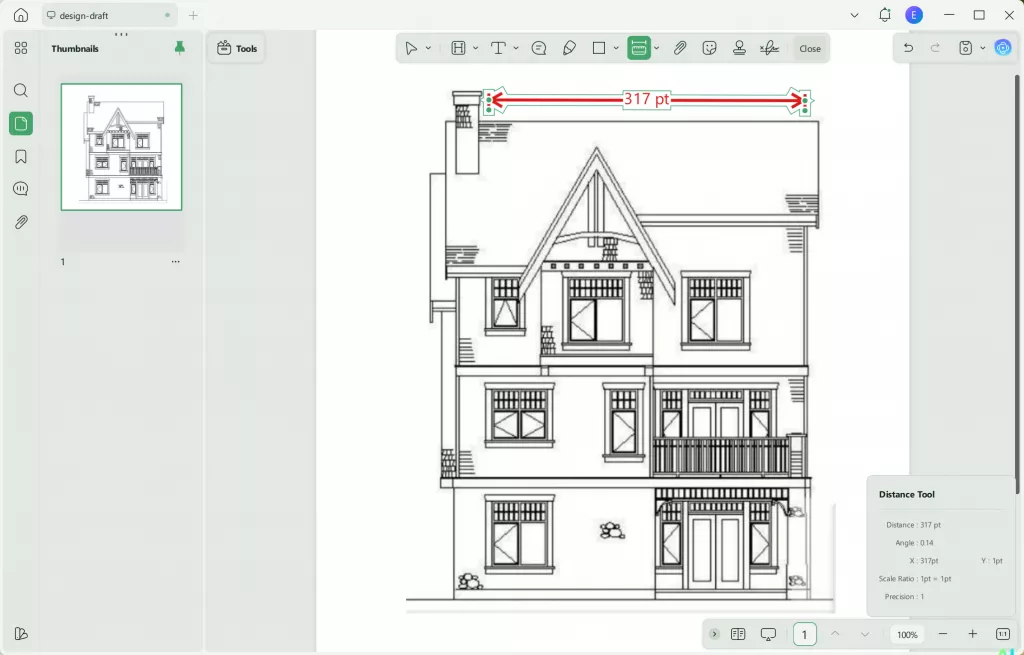
This functionality is invaluable for designers, architects, and anyone needing precise measurements within their PDFs. Whether you're ensuring that your document adheres to specific layout requirements or simply curious about the spacing between elements, UPDF provides the tools you need with ease and efficiency.
Ready to take your PDF management to the next level? Explore UPDF today and unlock the full potential of your documents with precision and ease.
Windows • macOS • iOS • Android 100% secure
Part 3. Bonus Tip: How Do I Find the Pixel Size of a PDF?
Transitioning from understanding the physical and design dimensions of PDF files, we now shift our focus towards a digital-centric metric: the pixel size of a PDF. This measure is especially pertinent in the realm of web design and digital content creation, where pixel dimensions play a crucial role in ensuring optimal display and performance.
Here, UPDF once again proves to be an invaluable tool. With its comprehensive suite of features, UPDF not only facilitates the examination of distances and design dimensions but also empowers users to delve into the pixel dimensions of their PDFs. Embrace the precision and versatility UPDF offers and elevate your digital content to new heights.
Windows • macOS • iOS • Android 100% secure
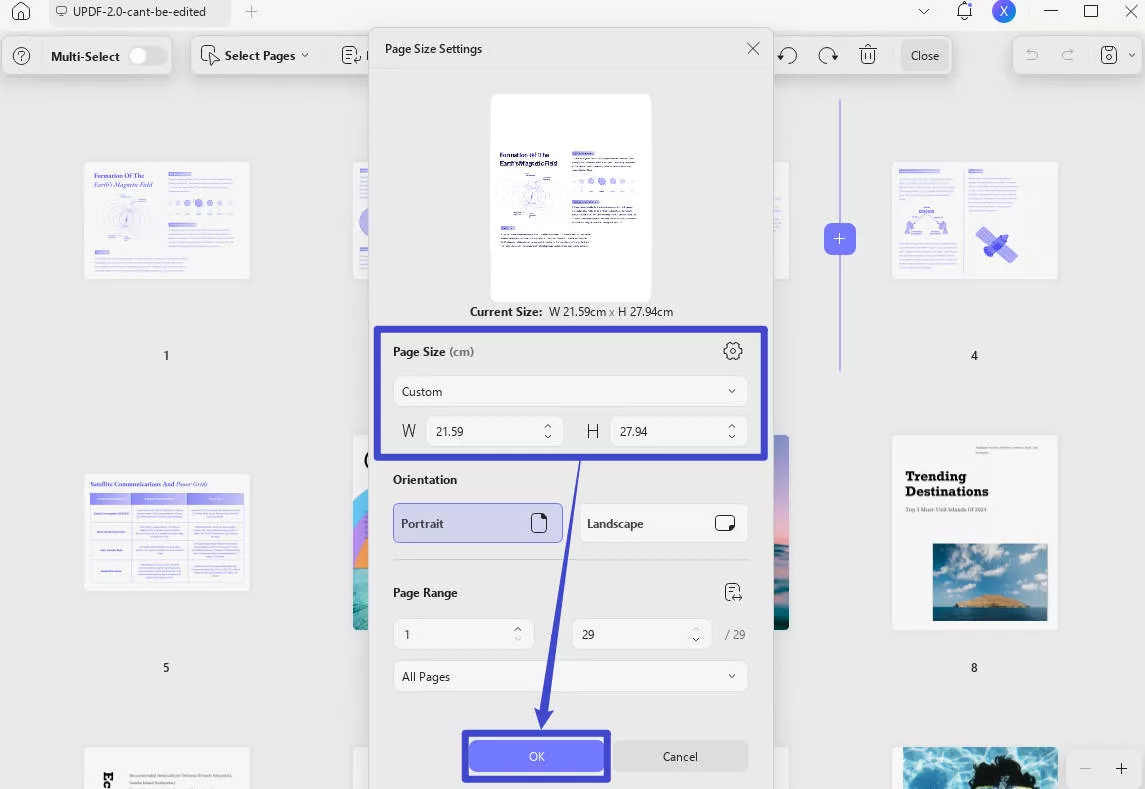
While UPDF currently excels in providing detailed insights into the pixel dimensions of PDF documents, it's worth noting an exciting upcoming feature that will further enhance its capabilities. Soon, UPDF will introduce the ability to view the physical dimensions of PDFs, allowing users to switch between different units (such as inches or centimeters) directly within the software.
This feature, accessible "Organize Pages" > "More" > "Page Size" menu, promises to bridge the gap between digital and print worlds, providing a comprehensive understanding of your document's size. Stay tuned for this update and prepare to unlock even greater flexibility and precision in managing your PDFs with UPDF.
Beyond its capabilities in measuring dimensions, UPDF stands as a comprehensive PDF editor, offering a superior alternative to mainstream options. With features like text editing, image adjustment, annotation, and signature addition, UPDF caters to all your document needs, combining functionality with an intuitive interface for an unmatched user experience.
Conclusion
Navigating the complexities of PDF dimensions is made effortless with the right tools at your disposal. UPDF emerges as an indispensable solution, blending ease of use with powerful features. Elevate your PDF experience by choosing UPDF, the definitive tool for accurately checking and editing your documents. Embrace simplicity and precision with UPDF today.
Windows • macOS • iOS • Android 100% secure
 UPDF
UPDF
 UPDF for Windows
UPDF for Windows UPDF for Mac
UPDF for Mac UPDF for iPhone/iPad
UPDF for iPhone/iPad UPDF for Android
UPDF for Android UPDF AI Online
UPDF AI Online UPDF Sign
UPDF Sign Edit PDF
Edit PDF Annotate PDF
Annotate PDF Create PDF
Create PDF PDF Form
PDF Form Edit links
Edit links Convert PDF
Convert PDF OCR
OCR PDF to Word
PDF to Word PDF to Image
PDF to Image PDF to Excel
PDF to Excel Organize PDF
Organize PDF Merge PDF
Merge PDF Split PDF
Split PDF Crop PDF
Crop PDF Rotate PDF
Rotate PDF Protect PDF
Protect PDF Sign PDF
Sign PDF Redact PDF
Redact PDF Sanitize PDF
Sanitize PDF Remove Security
Remove Security Read PDF
Read PDF UPDF Cloud
UPDF Cloud Compress PDF
Compress PDF Print PDF
Print PDF Batch Process
Batch Process About UPDF AI
About UPDF AI UPDF AI Solutions
UPDF AI Solutions AI User Guide
AI User Guide FAQ about UPDF AI
FAQ about UPDF AI Summarize PDF
Summarize PDF Translate PDF
Translate PDF Chat with PDF
Chat with PDF Chat with AI
Chat with AI Chat with image
Chat with image PDF to Mind Map
PDF to Mind Map Explain PDF
Explain PDF PDF AI Tools
PDF AI Tools Image AI Tools
Image AI Tools AI Chat Tools
AI Chat Tools AI Writing Tools
AI Writing Tools AI Study Tools
AI Study Tools AI Working Tools
AI Working Tools Other AI Tools
Other AI Tools PDF to Word
PDF to Word PDF to Excel
PDF to Excel PDF to PowerPoint
PDF to PowerPoint User Guide
User Guide UPDF Tricks
UPDF Tricks FAQs
FAQs UPDF Reviews
UPDF Reviews Download Center
Download Center Blog
Blog Newsroom
Newsroom Tech Spec
Tech Spec Updates
Updates UPDF vs. Adobe Acrobat
UPDF vs. Adobe Acrobat UPDF vs. Foxit
UPDF vs. Foxit UPDF vs. PDF Expert
UPDF vs. PDF Expert








 Enola Davis
Enola Davis 
 Enrica Taylor
Enrica Taylor 
 Enya Moore
Enya Moore 
 Enola Miller
Enola Miller 
